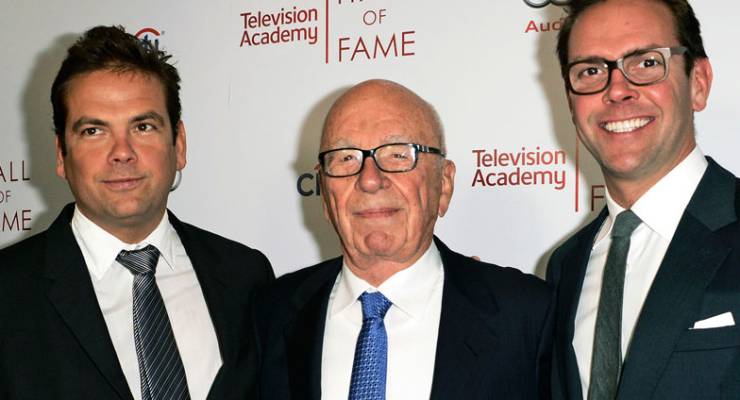
On Wednesday the Disney-Fox carve up ended and a new, slimmer Fox emerged. As a result of the deal the main Murdoch trio — Rupert and sons Lachlan and James — are collectively over A$800 million richer than before, with no real immediate need to tap into their portions of the US$12 billion in cash and Disney shares the Murdoch Family Trust has just been paid.
The new, smaller Fox started trading on its own from Wednesday. Shares closed at US$37.63 — just under the US$38 price in the Disney offer, which became a cash price of US$51.57 per share in the final exchange of shares. That’s because some Fox shareholders took Disney shares alone.
The deal has made the Murdoch Family Trust and its members — Murdoch’s seven children — nearly US$12 billion richer, with media reports saying this will be distributed to trust members in the most tax-advantageous way. The fact that the trust is registered in ultra-low tax Nevada (the city of Reno) gives us an idea how low the tax will be. The precise market value of the new Fox isn’t known accurately at time of writing, but will be close to US$70 billion.
Breaking down the cherry on top
But outside the Trust’s riches, the three Murdoch men — and especially Dad and son James — are much wealthier in their own right thanks to Disney. According to the 2018 proxy statement for 21st Century Fox, Rupert Murdoch owned a total of 8.9 million A and B class Fox shares. At the cash offer component of the Disney offer of US$51.57 per share, his shares were worth US$459.9 million, or A$649.71 million.
James Murdoch, meanwhile, owned a total of 2.1 million A and B class shares in the company (non-voting and voting). At the cash offer component from Disney, his shares were worth US$112.5 million in cash (around A$158 million). That’s enough to seed his investment ambitions once he leaves Fox in the not-too-distant future. James won’t have to dip into his Murdoch Family Trust honeypot for quite a while.
Where to next?
21st Century Fox revealed last week that James Murdoch had signed a non-compete addition to his employment contract with the company, which stopped him from joining a specified competitor of Fox for a year after his departure as. The “agreed upon list of companies” were not named in the filing with US regulators, but we can round up the usual suspects (excluding Disney).
There is nothing in that agreement, however, that prevents James Murdoch from joining a board of a competitor, or even becoming a non-executive chair of a rival like Facebook, Google or Twitter.
And what of brother Lachlan, who is staying put as CEO and co-executive chair with dad? Well he’s never been a big direct investor in Fox (unlike James or Rupert), preferring to keep his fortune in the cookie jar otherwise known as the Murdoch Family Trust, and in Australian radio through NOVA. The 2018 proxy statement says Lachlan owned a total of 148,977 A and B class shares in Fox. They had a cash value of US$7.68 million or A$10.8 million, which is not really enough to finance any further extensions to the family mansion in Sydney’s Eastern Suburbs.
But true to form, Fox, being a Murdoch-dominated company and not very welcoming of newcomers — slipped out an updated poison pill arrangement overnight Wednesday which stops anyone buying 15% or or more of the B class voting shares without Murdoch approval by triggering the issue of hundreds of millions of new shares to existing holders. That’s a form of takeover insurance on top of the Murdoch’s 39% holding of the voting shares. (The old 21st Century Fox had a similar arrangement, as does the other Murdoch company, News Corp.)
The Murdochs talk the talk on the virtues of competition, except when it comes to their own interests. In that they share the same hypocrisy as the founders of those tech giants they love to hate and whine about — Facebook, Google, Amazon, and Twitter all have different classes of shares that cement founder control, just like at Fox Corp and News Corp.








Nice pic. “Uncle Scrooge with Goofy and Pluto”? Photo-shopped?
More like – Elmer Fudd with Heckle & Jeckle.
Hope they can survive without a $36000000 Australian tax payer gift to Foxtel this year.
Disgusting that our newspapers, especially Murdoch influenced, have sold out to the LNP . No matter what the papers try to tell us, thinking Australian’s experience, and remember Murdoch one sided hypocracy, and the ‘fake’ news from, and the rorts of politicians. Australians vote politicians OUT, and it is time for a change.
Imagine Murdoch Snr’s ongoing angst when waking each morning only to be reminded he doesn’t own Facebook & Google.
I can imagine him emerging from his formaldehyde cocoon to the sickening realisation he is not yet the omnipresent demigod of propaganda.
And remembering his MySpace debacle. And Lachie’s OneTel achievement – a lazy billion wasn’t it?
The only members of that family with integrity and ability are second wife Anna and her daughter Elisabeth who is quite a respected business brain.